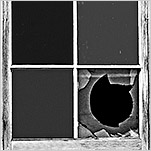A Pakistani neuroscientist facing trial on charges that she tried to kill military officers and F.B.I. agents in Afghanistan erupted in a Manhattan courtroom and accused a witness of lying on Tuesday, as testimony began in her federal trial.
The neuroscientist, Aafia Siddiqui, 37, was ushered out of the courtroom after her outburst, in which she also said that she had been locked in a secret prison since her arrest. She is charged with shooting at Army officers and F.B.I. agents while being detained in Afghanistan in July 2008.
Ms. Siddiqui, who is said by intelligence officers to have ties to Al Qaeda, was taken into custody in the city of Ghazni after she was found loitering outside a provincial governor’s compound with suspicious items in her handbag, including a book called “Anarchist Arsenal,” according to an indictment.
Her remarks on Tuesday came within minutes after the first witness, Capt. Robert Snyder Jr. of the Army, was called to the stand in Federal District Court. He said Ms. Siddiqui’s purse contained handwritten notes about a “few ounces of radiation material” and a list of New York landmarks — the Empire State Building, Wall Street, the Brooklyn Bridge and the Statue of Liberty.
“I was never planning to bomb it!” Ms. Siddiqui shouted before being led away, her voice piercing the hushed courtroom. “You’re lying!”
While she was being detained, prosecutors say, Ms. Siddiqui, who has biology and neuroscience degrees from the Massachusetts Institute of Technology and Brandeis University, grabbed an M4 rifle that an interpreter had left leaning against a wall and fired at least two shots toward the agents and officers who were there to question her.
No one was hit, and a soldier returned fire, hitting Ms. Siddiqui in the torso. She has recovered from that wound.
During the shooting, Ms. Siddiqui “looked determined, very agitated, maybe a bit tired,” Captain Snyder said in response to questions from David Rody, a prosecutor. And the look on her face, Captain Snyder said, was “a vision of hatred.”
But defense lawyers said there was so much confusion that night in the room where she was being questioned that it was hard to tell for sure what took place.
“What we expect to show is that there are very different versions of this story,” said Charles Swift, a defense lawyer, in his opening arguments. The items from Ms. Siddiqui’s purse were not credible as evidence, defense lawyers suggested, because they were sloppily handled.
Another prosecution witness, John Threadcraft, said under cross-examination, “I would say at least three people touched the items,” which were later left unattended in a truck.
Mr. Threadcraft, who was then a liaison officer with the Army, testified that the contents included papers with words like “dirty bomb,” “bioweapons” and “Ebola.” “I remember something that looked like a fuse, a cigarette on a cord,” he said.
Ms. Siddiqui has had several outbursts in previous court appearances, raising questions about her competency to stand trial. But the judge presiding over her case, Richard M. Berman, ruled in July that Ms. Siddiqui “has a rational as well as a factual understanding of the proceedings against her” and could assist with her defense.











